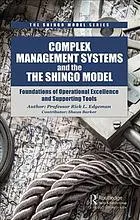Complex management systems and the Shingo model: Foundations of operational excellence and supporting tools
4.8
بر اساس نظر کاربران

شما میتونید سوالاتتون در باره کتاب رو از هوش مصنوعیش بعد از ورود بپرسید
هر دانلود یا پرسش از هوش مصنوعی 2 امتیاز لازم دارد، برای بدست آوردن امتیاز رایگان، به صفحه ی راهنمای امتیازات سر بزنید و یک سری کار ارزشمند انجام بدینمعرفی کتاب: سامانههای مدیریت پیچیده و مدل Shingo - مبانی تعالی عملیاتی و ابزارهای پشتیبان
کتاب «سامانههای مدیریت پیچیده و مدل Shingo: مبانی تعالی عملیاتی و ابزارهای پشتیبان» نوشته «Barker, Shaun; Edgeman, Rick L.; Shing»، به طور مفصل به مفاهیم بنیادی مدیریت پیچیده و روابط آن با مدل Shingo پرداخته است. این کتاب در راستای فهم عمیقتر تعالی عملیاتی و ابزارهای مکمل آن، یک منبع ارزشمند محسوب میشود. در ادامه، نگاهی دقیقتر به موضوعات کلیدی این کتاب خواهیم داشت.
خلاصهای کامل از کتاب
این اثر بر نقش مدل Shingo به عنوان یکی از قدرتمندترین چارچوبهای تعالی عملیاتی تاکید دارد. مدل Shingo با تمرکز بر اصول بنیادین تعالی، به سازمانها کمک میکند تا فرهنگ سازمانی پایداری ایجاد کنند. نویسندگان کتاب توضیح میدهند که برای دستیابی به نتایج پایدار، تمرکز صرف بر ابزارها و تکنیکها کافی نیست، بلکه باید اصول رهبری، انسجام و تفکر سیستمی مورد توجه قرار گیرند.
یکی از ویژگیهای برجسته این کتاب، ارتباطدهی بین مدیریت پیچیده، تفکر سیستماتیک، و قابلیتهای تعالی عملیاتی است. نویسندگان معتقدند که زمانی که سازمانها مدیران خود را به اصول مدل Shingo مسلح میکنند، میتوانند به اثرگذاری عمیق بر بهرهوری و بهبود فرایندها دست یابند. این کتاب راهنمایی جامع برای رهبران سازمانی است که میخواهند ابزارهای عملیاتی نوین را با فرهنگ سازمانی خود تطبیق دهند.
نکات کلیدی کتاب
- مدل Shingo اصولی پایهای شامل پیادهسازی سیستماتیک فرهنگ تعالی را آموزش میدهد.
- فهم دقیقتر از سامانههای مدیریت پیچیده زمینهای پویا برای تصمیمگیری بهتر ایجاد میکند.
- پیوند میان تعالی عملیاتی و رفتار انسانی بر آمریکا و جهانیسازی مدل Shingo تاکید میکند.
- استفاده از لگوهای قدرتمند و چارچوبهای مدیریت کیفیت مانند Lean و Six Sigma.
نقلقولهای معروف از کتاب
«بدون درک مناسب از اصول تعالی، حتی پیشرفتهترین ابزارهای مدیریتی هم نخواهند توانست تاثیری ماندگار ایجاد کنند.»
«در قلب هر سازمان موفق، فرهنگی جای دارد که نه تنها به تعالی اهمیت میدهد، بلکه آن را در عمل نیز پیاده میکند.»
«تفکر سیستمی ابزار لازم برای مدیریت پیچیدگیها و تقویت کارکردهای مدیریتی را فراهم میکند.»
چرا این کتاب مهم است؟
این کتاب برای رهبران سازمانی، اساتید حوزه مدیریت و تحلیلگران سیستمها دارای اهمیت است. در دنیایی که پیچیدگیهای مدیریتی روزبهروز افزایش پیدا میکنند، یادگیری اصول ارائه شده توسط مدل Shingo به سازمانها در دستیابی به پایداری و نوآوری این امکان را میدهد. نویسندگان کتاب با سبک نوشتاری روان خود این قدرت را دارند که مفاهیم پیچیده را به زبانی ساده و در عین حال علمی توضیح دهند.
در نهایت، کتاب «سامانههای مدیریت پیچیده و مدل Shingo» ارزش خود را نه تنها در جنبههای عملیاتی بلکه در آموزش فرهنگ سازمانی پایدار نشان داده و به عنوان منبعی جامع برای تحقق تعالی عملیاتی شناخته میشود.
Introduction to "Complex Management Systems and the Shingo Model: Foundations of Operational Excellence and Supporting Tools"
"Complex Management Systems and the Shingo Model: Foundations of Operational Excellence and Supporting Tools" serves as a comprehensive guide to understanding the intricacies of management systems in today's dynamic world. Authored by Barker, Shaun, Edgeman, Rick L., and Shing, the book delves into the intersection of operational excellence, strategic alignment, and continuous improvement—offering both practical applications and theoretical insights. By leveraging the Shingo Model's principles, the book acts as a singular resource for business leaders, practitioners, and learners seeking to streamline operations and sustain long-term results.
Central to the book's philosophy is the recognition that organizations do not operate in isolation. They are vibrant systems composed of people, processes, and values. These components must function harmoniously to ensure adaptability and excellence in a rapidly evolving global landscape. The Shingo Model, with its emphasis on aligning behaviors and principles with operational strategy, provides the necessary framework for achieving balance within complex management systems. What sets this work apart is its ability to bridge theoretical frameworks with actionable insights, making it indispensable for those leading transformational efforts in their organizations.
Detailed Summary of the Book
The book is structured to provide readers with a foundation in both the theoretical underpinnings and practical implementations of complex management systems. It opens by examining the challenges faced by organizations attempting to navigate complexity in business ecosystems. Through the Shingo Model, the authors demonstrate how organizations can rise beyond reactive decision-making and aim for systemic alignment based on enduring principles such as respect, humility, and cultural integrity.
Subsequent chapters explore the various dimensions of operational excellence, from leadership and strategy deployment to robust process design. The authors emphasize the significance of understanding root causes and measuring impact rather than merely addressing symptoms. They introduce tools and techniques to help organizations cultivate a culture of continuous improvement while fostering employee engagement at every level.
A standout aspect of the book is its case studies and real-world examples. These narratives highlight organizations across industries and spotlight the role of the Shingo philosophy in their transformation journeys. The authors expertly balance the depth and breadth of their exploration, ensuring readers understand both the big picture and nuanced details of creating and sustaining complex management systems.
Key Takeaways
-
Organizations function as complex systems requiring alignment between principles, behaviors, and operational strategies to achieve true excellence.
-
The Shingo Model offers a unique framework for embedding operational excellence into both daily management and long-term strategies.
-
Leadership commitment and a culture of respect are critical drivers in fostering sustainable improvement and innovation.
-
Practical tools and techniques allow organizations to measure performance, sustain change, and engage employees effectively.
-
Root cause analysis and systemic improvement hold the key to addressing inefficiencies rather than merely treating symptoms.
Famous Quotes from the Book
"Operational excellence is not a destination, but a journey of continuous inquiry, learning, and improvement."
"Respect, humility, and a genuine curiosity for learning form the foundation of any successful transformation."
"To understand the whole, we must first master its parts while never losing sight of their interplay."
Why This Book Matters
As organizations contend with ever-increasing demands, disruptive innovations, and complex ecosystems, the need for robust management systems has never been greater. "Complex Management Systems and the Shingo Model" equips leaders with the principles and tools required to thrive in such an environment. Unlike many management books that focus on isolated quick fixes, this work provides a holistic and systemic approach to operational excellence. It not only emphasizes tangible improvements but also prioritizes intangible factors like cultural transformation and principled leadership.
Whether you are a seasoned business leader, a lean practitioner, or a student of management, this book offers invaluable lessons that can be directly applied to modern organizations. It goes beyond theory to provide actionable frameworks that catalyze sustainable innovation and growth. By aligning behaviors and strategies with timeless principles, the book ultimately seeks to cultivate organizations that are not only excellent but also resilient and humane.
دانلود رایگان مستقیم
برای دانلود رایگان این کتاب و هزاران کتاب دیگه همین حالا عضو بشین
برای خواندن این کتاب باید نرم افزار PDF Reader را دانلود کنید Foxit Reader


